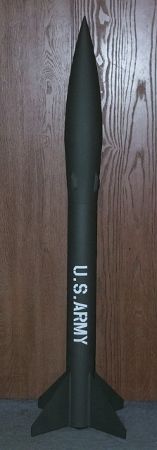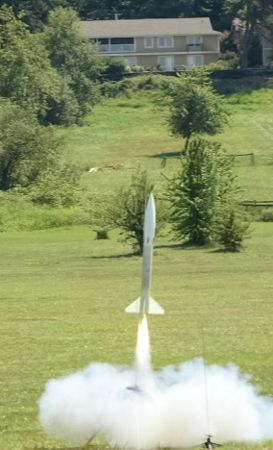Madcow Rocketry Honest John (Fiberglass)
Madcow Rocketry - Honest John (Fiberglass) {Kit}
Contributed by Tim Doll
| Construction Rating: | starstarstarstarstar_border |
| Flight Rating: | starstarstarstarstar_border |
| Overall Rating: | starstarstarstarstar_border |
| Manufacturer: | Madcow Rocketry  |
Brief:
The Madcow Rocketry Honest John Style M31 is a mid to high power fiberglass scale model of the 1950's vintage US Army Artillery Rocket. This Honest John uses a 29mm engine mount and a 2.6" diameter main body tube (it's basically the same size/scale as the Estes Maxi-Brute Honest John). I noticed this kit while putting together an order on the Apogee web site. I'd lost an Estes Maxi-Brute Honest John that I'd converted to 29mm mount at NARAM 50 (rocket eating tree), and I was intrigued by the idea of an all fiberglass rocket so I added it to my order.

Construction:
The kit arrived in a clear plastic bag. In the bag:
- 1 Fiberglass nose cone
- 1 G10 nose cone base plate
- 1 Pre-slotted G10 main body tube
- 2 G10 centering rings
- 1 29mm G10 motor tube
- 4 G10 fins
- 2 Eyebolt, nut, washer sets
- 1 Nylon shock cord
- 2 ¼" launch lugs
- 2 Plywood launch lug standoffs
- 4 Plywood nose cone rocket facade
- 1 Vinyl decal
- 1 9" x 9" chute protector
- 1 30" nylon parachute
Although not shown on the Apogee website, Madcow sells this kit with or without the parachute and chute protector. If desired, you can save $20 by getting it without the recovery components.
The parts are all high quality and construction is pretty straightforward and typical for a through-the-wall fin rocket, however, I do have a grip about the kit, specifically the 'fit' of the parts. The through-the-wall fin tangs are intentionally too long--the idea being to sand them down to get a perfect fit against the motor tube and the body tube. That'd be fine if we were talking maybe 0.01 inches, but the fin tangs were about 1/16 inch too long. It takes a lot of filing and sanding to take 1/16" of G10 material off four fin tangs (and keeping everything square is important). Worse, there is a potential gotcha: there is a radius on the fin tang such that, even with the tang the correct depth, the fin will 'bottom' on the radius before the fin touches the main body tube. If you don't notice that, you can make the tang too short trying to get the fin to match up to the body tube. It's necessary to either elongate the body tube slots a bit or trim down the radius before the fin will sit flush with the body tube. Similarly one of the centering rings was very loose on the motor tube (as in a readily visible gap), the second centering was better but still a loose fit. It was necessary to tack them in place with thick CA before I was able to properly epoxy them. Lastly, the shoulder of that huge nose cone was too large to fit into the body tube--it took quite a bit of sanding to obtain the correct fit (at least now that I have a good fit, I don't have to worry about it changing with the humidity). On the plus side this thing is impressively strong. It genuinely looks like it could lawn dart and still be flight worthy.
The instructions are good and straightforward. It's really a pretty simple kit, and if everything had fit properly, it could easily be built in an afternoon. Scale detail is lacking, but that's not what this rocket is about. Heck, it even lacks a boat tail. (If you want scale detail go with the same size Estes Maxi-Brute Honest John, assuming you can find one.) In fact, the only scale 'details' outside of the basic size/shape are the four 'spin motor facades' (since the real Honest John was an unguided missile, small rocket motors on the nose imparted a spin to improve accuracy). Even these are rather crude, simply four sided pieces of laser cut 1/4" plywood. I used a Moto-tool to shape the plywood pieces to something resembling the real spin motors, but as I noted, this rocket isn't about scale accuracy.
I made two changes during assembly. First, while perhaps not necessary, I had a couple feet of 1/4" Kevlar® cord lying around that I added between the engine mount eyebolt and the nylon shock cord. Second, I added an Aero Pack retainer for positive engine retention.
Finishing:
Finishing is relatively easy if you decide to paint it. I flew it 'naked' for its first flight and no one even commented. It looks OK unpainted, and the semi-translucent G10 main body tube means that you can make out the primary components (parachute, engine mount, and chute protector) through the unpainted body. However after that flight I did go ahead and give it a proper paint job. Two coats of primer with just a light sanding after each coat, then a coat of Krylon Olive Drab did the trick. The only areas that required any particular attention to get a first rate finish are the plywood parts (spin motors and launch lug standoff) and the epoxy fin fillets. The kit includes a pre-cut vinyl "US ARMY" appliqué that went on easily and is a nice touch.
While overall this is a good build, I have to downgrade it to four stars. While I'm big into scale, I don't mind the lack of details--that's not what this rocket is about. What I do mind is the mediocre fit of the parts. I expected better. On the plus side everything is high quality, and the fiberglass and G10 components make this an impressively strong rocket.
Construction Rating: 4 out of 5

Flight:
Since the first flight was going to be on a relatively small field, I selected an F40W-4 RMS for first flight. Interestingly, this motor isn't included on the list of recommended motors. However, RockSim said it would be fine. I was using a six foot launch rod, so stable velocity not occurring until 60" wasn't a concern. (The Apogee website has a downloadable RockSim file for the Honest John, a nice bonus.)
Although the rocket has a chute protector, I like to add a little dog barf wadding between the motor and chute protector for the extra protection. (Plus it protects the chute protector from the worst of the hot gases, so it lasts longer as well.)
Liftoff with the F40W was impressive and noisy. The boost was near perfect. RockSim had predicted 675 ft and that appeared to be about right. Motor ejection was within a few feet of apogee and the chute opened moments later.
Recovery:
Although the chute was fully deployed, I noticed the descent was fairly rapid and when it landed the rocket bounced several feet in the air. There was no damage to the G10 body or fins, but there were obvious cracks in the epoxy fillets on two fins and one of those fins was loose. The damage was readily repairable, but I was rather disappointed that a seemingly indestructible rocket suffered enough damage landing on a grass field that it needed repairs before it could be flown again. Madcow lists the rocket as 28 ounces. Mine came out a little heavier at just a touch under 30 ounces. Either way, flight ready weight is going to be on the plus side of two pounds so a 30 inch parachute seems a little small. There is always the trade off of touchdown velocity vs wind drift and I expect that I'll normally fly this on G or H motors, so the smaller chute would help prevent excessive drift. (This kit is not provisioned for dual deploy so implementing dual deploy would require some creativity.) Depending on where and how you plan to fly this Honest John, you may want to consider using a larger parachute.
It flies very nice, but I'm giving it a one star demerit for the rapid descent/touchdown damage - 4 stars.
Flight Rating: 4 out of 5
Summary:
This is a nice kit, but I'm a little disappointed. I'd recently built a Madcow Jayhawk and everything fit like the proverbial glove, so I was more than a little surprised at the mediocre fit of some of the Honest John parts. Similarly I was surprised when, in spite of the incredibly strong components, it suffered enough damage after a nominal recovery that it needed repairs before it could be flown again. On the plus side, this rocket is stout. I suspect it can handle any engine that'll fit, even if you modify it with a larger engine mount. It's also a relatively quick, easy build--even with the ill-fitting parts--and is a breeze to finish. It does lack scale details, but I didn't downgrade for that as I don't think that is what this rocket is about (as noted earlier, if you're looking for a nicely detailed scale model Honest John, go find the Estes Maxi-Brute kit).
Overall Rating: 4 out of 5
 |
 |
Flights
Sponsored Ads
 |
 |











